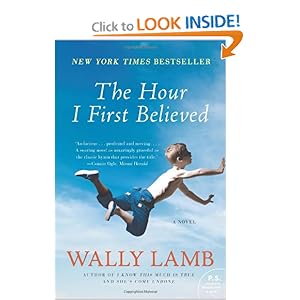Best Book this year
Posted: Tue Dec 13, 2011 11:43 pm
Ok, it doesn't have to be a new or recently published book, but what is your best read of this year?
One only please!
One only please!
have fun, relax, but above all ARGUE!
http://www.theplanbforum.com/forum/
Ex-cop Vincent Ruiz rescues a young woman from a violent boyfriend but wakes next morning to find that she's robbed him. It was a set up – an elaborate scam. Setting out to find Holly Knight, Ruiz discovers her boyfriend's tortured body and realises that powerful men are looking for the same girl. What did she steal that was so important?
Meanwhile, two thousand miles away, Pulitzer prize-winning Journalist Luca Terracini is living 'outside the wire' in Baghdad and investigating a disappearance of billions in reconstruction funds. The trail will lead him to London where he teams up with Ruiz and together they investigate the disappearance of an international banker and a mysterious 'black hole' in the bank's accounts.
THE WRECKAGE is an international conspiracy thriller involving clandestine agents and powerful nations who seek to bury secrets and manipulate the truth. It's about the money, politics and power. Who has it, who wants it and who's ultimately going to pay.
Want to read more? Download the first chapter of THE WRECKAGE
Full review hereA few years ago, the permanent secretary of the Nobel Prize jury had some less than charitable things to say about American literature. “The U.S. is too isolated, too insular,” the secretary, Horace Engdahl, argued. “They don’t translate enough and don’t really participate in the big dialogue of literature. That ignorance is restraining.” His comments upset some people on our shores, but despite the obvious oversimplification he was right.
Recently, much of American literature seems to have been looking inward. That’s one of the many reasons Julie Orringer’s first novel, “The Invisible Bridge” (which follows her well-regarded story collection, “How to Breathe Underwater”) deserves to be praised. It takes the introspective themes we’ve loved so well in American literature — from Walt Whitman’s “Song of Myself” to A. M. Homes’s “Music for Torching” — and points them in a different direction.
Orringer’s central character, Andras Levi, is a promising student of architecture who leaves his native Hungary to study in Paris in the late 1930s — until his scholarship is revoked when anti-Jewish laws go into effect. As you might expect, the trials he and his wife and their extended families face will grow exponentially worse in the years to come. Their happiest days and, later, their struggles, are rendered in sweeping, epic fashion.
The war in Europe drives Andras and his wife, Klara, apart, as it does so many of the people around them. After returning to Hungary, Andras is relatively lucky, assigned to a labor unit while others wind up on the brutal eastern front or at a mining camp in Siberia. Then, in a cruel twist, a newly exposed secret from Klara’s past threatens to further disrupt her family’s fortunes. The Levis’ experiences give us a close look at the terrible ways that enormous historical events can affect individual lives.
